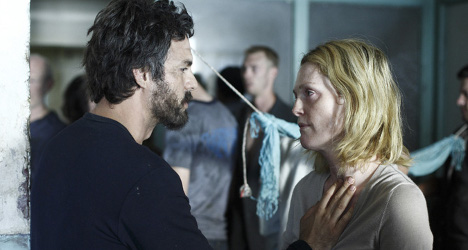
Blindness
What it's about:
A mysterious virus spreads through a city, striking its victims blind instantly. The sufferers are quarantined in an abandoned hospital, where they attempt to cling to civilisation in a dysfunctional society.
What we thought of it:
"I'm blind."
They’re simple words - the opening line of Blindness – but to most of us, they spell out an unimaginable nightmare. To be lost, helpless, at the mercy of those around us. Unless, of course, everybody else goes blind too.
That’s the premise behind Fernando Meirelles’s new film, based on a novel by Jose Saramago. A man is robbed of his sight by an inexplicable virus in the middle of traffic. Panicked, he goes to an ophthalmologist – and by morning, the doctor and all of his patients are also blind. The government quickly realises that they have a highly infectious disease on their hands and, in an attempt to limit its spread, they round up the sufferers and quarantine them in a disused hospital. Cut off from the world, the victims have to learn to cope in their new surroundings by establishing some semblance of society.
And that’s where things start going seriously wrong. In a Lord of the Flies-like scenario, when a group of people are all reduced to the same level of helplessness, the most ruthless thrive. The doctor and his wife (in solid performances from Mark Ruffalo and Julianne Moore) find themselves in charge of a ward of people trying to deal with their affliction as best they can. Their passivity makes them easy prey to the more vicious inhabitants, led by a skin-crawlingly evil Gael Garcia Bernal. The doctor’s wife, however, has a secret – she can see.
The irony at play is, of course, that you’re watching a film that attempts to convey the terror of being suddenly sightless – and the filmmakers use some interesting visual trickery to hint at the experience. But there’s more to it than that: the loss of sight is a metaphor. For what, exactly, is never made clear – an abandonment of civilisation, perhaps, or maybe empathy – but it’s clear that the film wants you to look deeper. Fernando Meirelles has a knack for cutting to the brutality at the heart of humanity – as seen in City of God (2002) and The Constant Gardener (2005). Blindness, however, looks even more unflinchingly into the horrors we are capable of, and it makes for a movie that is intensely unpleasant to watch at times, and yet – appropriately – you can’t take your eyes off the screen.
Beyond the putrid setting and the stylised cinematography – Meirelles’s camera loves squalor, as seen in his depictions of the slums of Rio and Nairobi – the movie confronts us with some heavy questions to ponder: questions about the greater good of society, how much we are willing to sacrifice, and to what lengths we’d be willing to go to survive. There are echoes of Danny Boyle’s excellent zombie flick 28 Days Later, with survivors eking a living out of cities that look post-apocalyptic. Meirelles’s film manages to push the viewer’s boundaries even further, to where even zombies can seem blameless compared to humans.
It’s an uneasy, draining film, and not without its flaws, yet wholly worth the investment in watching it. The simple fact of sight becomes a beautiful gift in its aftermath.




 Publications
Publications
 Partners
Partners














